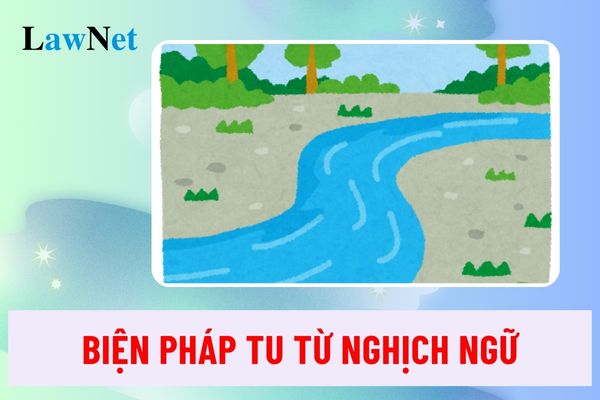What is the Juxtaposition rhetorical device? What are effects of the Juxtaposition rhetorical device according to Vietnamese Literature program?
What is the Juxtaposition rhetorical device? What are effects of the Juxtaposition rhetorical device according to Vietnamese Literature program?
The Juxtaposition is a special rhetorical device in which the writer or speaker uses words or phrases with opposite meanings to create surprising expressions, making a strong impression and producing unique artistic effects.
Effects of the Juxtaposition rhetorical device:
Creates artistic effect: Makes the sentence lively and attractive, leaving a strong impression.
Highlights meaning: Emphasizes a particular aspect of the issue.
Creates surprise: Stimulates the curiosity and interest of the reader.
Enhances expression: Clearly expresses the emotions and attitudes of the speaker.
Examples of the Juxtaposition rhetorical device
Example 1: Khúc sông bên lở bên bồi/ Bên lở thì đục, bên bồi thì trong"
Juxtaposition: "lở" - "bồi", "đục" - "trong"
Analysis:
This folk verse uses pairs of opposite words to describe a natural phenomenon: the changing of the river.
"Lở" and "bồi" contrast, showing the constant movement of the water.
"Đục" and "trong" contrast, eliciting the diversity of the scenery.
Effect: Creates a vivid, contrasting image, evoking the ceaseless changes of life.
Example 2: "Hạnh phúc của một tang gia" (Vu Trong Phung)
Juxtaposition: "hạnh phúc" - "tang gia"
Analysis:
This sentence uses two completely opposite concepts to create irony and satire.
"hạnh phúc" is usually associated with joy, while "tang gia" implies pain and loss.
Effect: Exposes the moral decadence of a segment of society, where traditional values are reversed.
Example 3: "Tiếng chim tu hú gọi bầy/Yêu nước thương người bằng trời xanh biển rộng"
Juxtaposition: "tiếng chim tu hú" (natural sound) - "yêu nước thương người" (human emotions)
Analysis:
This verse uses natural imagery (iếng chim tu hú) to summarize a profound emotion (yêu nước thương người).
The unexpected comparison between the natural sound and human emotions creates a poetic, romantic image.
Effect: Expresses a fervent patriotism, as vast as the sky and sea.
Note: the above contents are for reference purposes.

What is the Juxtaposition rhetorical device? What are effects of the Juxtaposition rhetorical device according to Vietnamese Literature program? (Image from Internet)
Which grades are covered by the 2018 General Education Program for the Literature subject in Vietnam?
Based on the provisions in Article 2 Circular 32/2018/TT-BGDDT, the implementation of the general education program is as follows:
The general education program is implemented as follows:
1. From the academic year 2020-2021 for grade 1.
2. From the academic year 2021-2022 for grades 2 and 6.
3. From the academic year 2022-2023 for grades 3, 7, and 10.
4. From the academic year 2023-2024 for grades 4, 8, and 11.
5. From the academic year 2024-2025 for grades 5, 9, and 12.
Based on Section 1 of the Literature subject in the General Education Program issued together with Circular 32/2018/TT-BGDDT, the characteristics of the subject are as follows:
I. SUBJECT CHARACTERISTICS
Literature is a subject within the field of Language and Literature Education, taught from grade 1 to grade 12. At the primary level, it is called Vietnamese; at the Lower and upper secondary school levels, it is called Literature.
...
The 2018 General Education Program for Literature applies to students from grades 1 to 12 for the 2024-2025 school year, with the subject names as follows:
Primary school level: Vietnamese subject
Lower and upper secondary school levels: Literature subject.
Which grade in Vietnam studies the Juxtaposition rhetorical device according to the 2018 General Education Program for the Literature subject?
Based on Subsection 2, Section 5 of the Literature subject in the General Education Program issued together with Circular 32/2018/TT-BGDDT, the knowledge of grade 12 Vietnamese is as follows:
VIETNAMESE KNOWLEDGE
1. Preserve and develop Vietnamese
2. Logical errors, ambiguous sentences, and correction methods
3.1. Satirical and Juxtaposition rhetorical devices: characteristics and effects
3.2. Text types and genres
- Argumentative text: the role of arguments, reasoning, and evidence; purpose, feelings, and viewpoints of the writer; measures to enhance affirmation and negation in argumentative texts; argumentation and expressive language; speech at the launch of a movement or social activity; argumentative essay on issues related to youth; comparative and evaluative essay on two literary works of the same or different genres
- Informative text: the value of the topic, the main information of the text; types of data and their reliability; job exchange letters; report results of project assignments or research results on a natural or social issue
3.3. Respect and protect intellectual property rights in study and research
4.1. Basic characteristics of formal and informal language: understanding and application
4.2. Non-verbal communication tools: images, data, charts, diagrams, etc.
Grade 12 students study the Juxtaposition rhetorical device according to the 2018 General Education Program for the Literature subject.

